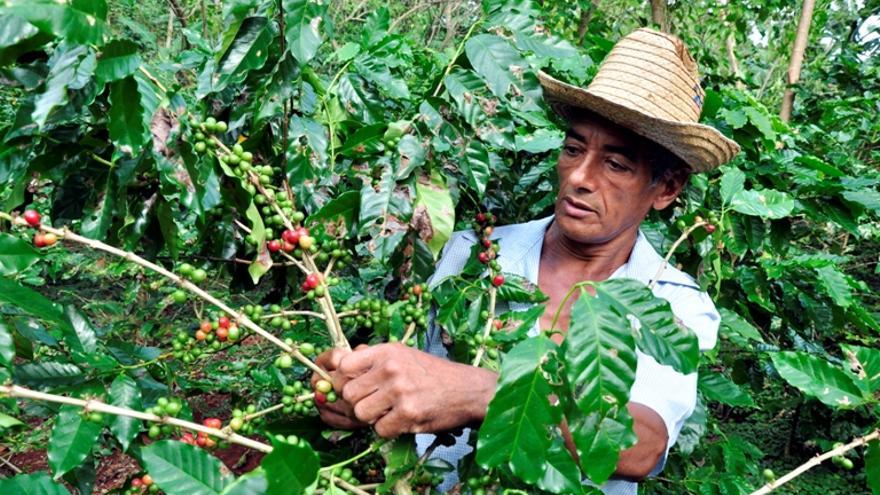
![]() 14ymedio, Madrid, 7 December 2023 — On Wednesday, Michelle Curto made a promise in Santiago de Cuba’s Hall of Mirrors for which he will be held accountable if he does not make good on it. “For every kilogram of Cuban coffee that is exported, the same amount must be made available to Cuban consumers,” said the Italian businessman, who serves as president of the Association for Cultural and Economic Exchange with Cuba. A political activist, Curto has also been trying for years to get the BioCuba Caffe project off the ground. That finally happened yesterday when the new public/private partnership had its official launch.
14ymedio, Madrid, 7 December 2023 — On Wednesday, Michelle Curto made a promise in Santiago de Cuba’s Hall of Mirrors for which he will be held accountable if he does not make good on it. “For every kilogram of Cuban coffee that is exported, the same amount must be made available to Cuban consumers,” said the Italian businessman, who serves as president of the Association for Cultural and Economic Exchange with Cuba. A political activist, Curto has also been trying for years to get the BioCuba Caffe project off the ground. That finally happened yesterday when the new public/private partnership had its official launch.
“Whenever we export coffee, we will have to ensure that there will be enough for the Cuban market. We will always keep the producers front and center,” said the Italian businessman. Many Cubans will find his statement hard to believe. They have grown tired of drinking a foul blend of equal parts coffee and peas while the authorities crow about how high the demand is for Cuban coffee and sign export deals.
The deputy minister of Foreign Trade, Ana Teresita Gonzalez, said the new venture is taking an innovative approach, moving away from conventional methods of coffee production
“The new venture is taking an innovative approach in that it does not rely on conventional methods of coffee production,” said the deputy minister of Foreign Trade, Ana Teresita Gonzalez. “It is committed to a clean product, promoting its preservation and [prioritizing] social responsibility. At the same time, it will encourage good agricultural practices in order to improve crop yields and coffee quality.”
Participating in the signing ceremony were Mario Cerruti, director general of the Italian Lavazza Foundation; Matteo Saccani, director general of Made in Italy; and Tamara Arzuaga, president of Cuba’s Agroforestry Mercantile Society.
Santiago de Cuba “is the benchmark for coffee production, supplying 40% of the country’s total volume of coffee beans,” explained the Agroforestry Mercantile Society’s Robeldi Nicot. Nevertheless, the province’s output has been falling dramatically for years, reducing the supply of rationed coffee in the entire eastern area of the country. Cerutti predicted, however, that “the results could be very good for this market sector” within a few years.
Lavazza, a prestige, moderately high-priced European brand, introduced Reserva de ¡Tierra! Cuba last October at an event in Madrid. The new coffee — a premium organic blend that is part of the company’s Reserva collection — will be marketed to the hospitality industry.
At that event, the company boasted of having launched a sustainable development program on the island in 2018 in collaboration with various institutions and local officials. Its goal has been to revive coffee cultivation in the country and restore the quality of raw Cuban coffee. It delighted in highlighting the benefits of the bean, extoling its “velvety body, with notes of almonds, milk chocolate and a sweet aftertaste of wine.” It stated that it was working closely with farmers, increasing the role of women and young people, and promoting respect for the environment.
Additionally, Lavazza attributed the drop in the island’s coffee production to the outbreak of rust disease. It failed to mention problems in the field including government defaults, supply shortages, the exodus of coffee producers and bad business practices, all which have made coffee largely unavailable to Cuban consumers.
It is not the first European company that has tried to get into the business of producing what was once one of the island’s premier products
It is not the first European company that has tried to get into the business of producing what was once one of the island’s premier products. The French company Malongo has also been to Santiago and plans to invest in a project located in Ramón de Las Yaguas (near the town of Songo la Maya) aimed at increasing coffee bean production.
The irony is that the old coffee plantation La Fraternidad, which was founded in 1791 by refugees fleeing the French revolution, is located on this site. It is currrently being restored with funds provided by the European Union and Malongo itself.
Another member of the Cuban-Italian alliance is Filorosso, a social justice and local development organization which provided the island with several ambulances and other medical equipment in September. The donation was financed with money it earned from sales of Cuban products, including Eastern Front coffee (at 15 euros for a 250 gram package), sold in Italy through its fair-trade store. It noted that these profits were being reinvested “in solidarity” with Cuba.
The thread connecting all these endeavors is the Agency for Cultural and Economic Exchange with Cuba, presided over by Curto himself. In a lengthy interview a year ago with a state-run news outlet entitled “Cuba Has Reconnected Me with My Utopias,” he bragged about having actively opposed a proposal by the mayor of Turin to grant honorary citizenship to Yoani Sanchez a year before the creation of 14ymedio, which she has directed since 2014.
____________
COLLABORATE WITH OUR WORK: The 14ymedio team is committed to practicing serious journalism that reflects Cuba’s reality in all its depth. Thank you for joining us on this long journey. We invite you to continue supporting us by becoming a member of 14ymedio now. Together we can continue transforming journalism in Cuba.
